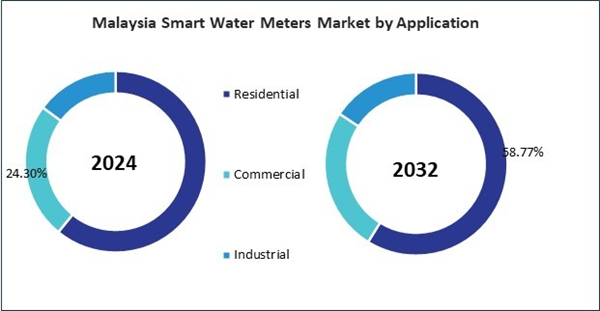The China market dominated the Asia Pacific Smart Water Meters Market by country in 2024, and is expected to continue to be a dominant market till 2032; thereby, achieving a market value of $951 million by 2032. The Japan market is registering a CAGR of 10.5% during 2025-2032. Additionally, the India market showcasing a CAGR of 12.5% during 2025-2032.
The uses of smart water meters are rapidly expanding as technological advancements unlock new functionalities and integration capabilities. While the primary function remains the accurate measurement and reporting of water usage, today’s smart meters often incorporate a suite of sensors and communication modules that extend their utility far beyond traditional metering. Advanced models can monitor temperature, pressure, flow rate, and water quality parameters in real time, providing utilities with comprehensive data for network diagnostics and predictive maintenance.
Additionally, the ability to detect leaks - sometimes as small as a few drops per second - has transformed water loss management, enabling the identification and repair of leaks long before they escalate into major incidents. In regions prone to drought or flooding, smart meters can be linked to automated irrigation or drainage systems, supporting dynamic responses to weather events and water availability. Additionally, integration with smart grids and other utility networks (such as gas and electricity) supports holistic resource optimization and infrastructure planning at the city or district level.
India’s smart water meters market is rapidly growing, driven by the nation’s water scarcity challenges and ambitious smart city initiatives. Since the 2010s, India has shifted from manual metering to smart systems, with pilot projects in cities like Delhi and Bengaluru. The Ministry of Jal Shakti’s Smart Meter National Programme, launched in 2019, aims to install millions of smart meters in urban households, addressing NRW losses and improving billing efficiency. Utilities like the Bangalore Water Supply and Sewerage Board have deployed IoT-enabled meters to enhance water management.
Japan’s smart water meters market is a leader in technological sophistication, driven by the nation’s commitment to resource efficiency and smart city development. Since the early 2000s, Japan has transitioned from traditional metering to smart systems, with utilities adopting automated meter reading (AMR) to improve billing accuracy. The Ministry of Land, Infrastructure, Transport and Tourism has promoted smart meters to address water management challenges, particularly in urban centers like Tokyo and Osaka. By 2024, Japan aimed for near-complete smart meter coverage, as outlined in government plans for water infrastructure modernization.
List of Key Companies Profiled
- Itron, Inc.
- Neptune Technology Group Inc. (Roper Technologies, Inc.)
- Honeywell International Inc.
- Badger Meter, Inc.
- Landis+Gyr Group AG
- Hubbell Incorporated
- Arad Group
- Diehl Stiftung & Co. KG
- B METERS S.R.L.
- Xylem, Inc. (Sensus)
Market Report Segmentation
By Technology
- AMR
- AMI
By Meter Type
- Electromagnetic Meter
- Ultrasonic Meter
- Mechanical Meter
By Application
- Residential
- Commercial
- Industrial
By Country
- China
- Japan
- India
- South Korea
- Singapore
- Malaysia
- Rest of Asia Pacific
Table of Contents
Companies Mentioned
- Itron, Inc.
- Neptune Technology Group Inc. (Roper Technologies, Inc.)
- Honeywell International Inc.
- Badger Meter, Inc.
- Landis+Gyr Group AG
- Hubbell Incorporated
- Arad Group
- Diehl Stiftung & Co. KG
- B METERS S.R.L.
- Xylem, Inc. (Sensus)









